Iran, Russia Sign Agreement To Expand Aviation Ties
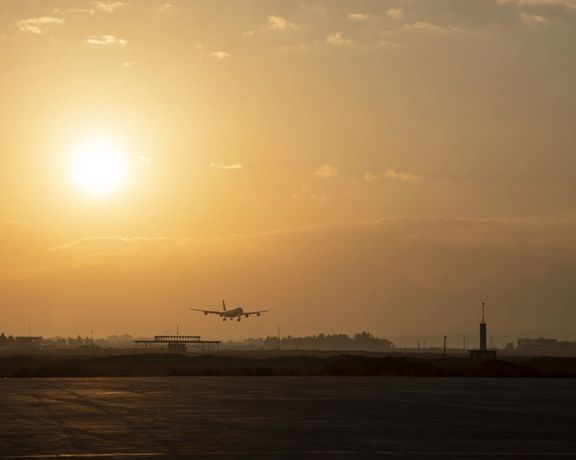
Iran and Russia have signed a new agreement to expand cooperation in the aviation sector, including increasing the number of passenger flights to 35 per week.

Iran and Russia have signed a new agreement to expand cooperation in the aviation sector, including increasing the number of passenger flights to 35 per week.
Spokesman for the Iranian Civil Aviation Organization Mir-Akbar Razavi announced the signing of a Memorandum of Understanding between Tehran and Moscow on Tuesday after a meeting between the head of the Iranian Civil Aviation Organization Mohammad Mohammadi-Bakhsh and a Russian deputy transport minister, whose name he did not mention.
The airlines of the two countries are now allowed to operate unlimited cargo flights without any capacity restrictions within the framework of the above agreement, he added.
The official said the two countries will sign another agreement on providing logistics services including maintenance and support for Russian planes as well as exporting parts and equipment manufactured in Iran to Russia.
Earlier on Tuesday, July 26, an Iranian lawmaker said military cooperation between Tehran and Moscow has upset the political equations of the global order, confirming Russia’s request to buy Iranian drones.
US National Security Adviser Jake Sullivan warned twice in July that Moscow appears to be looking at buying Iranian drones and Russian officers even visited a drone base in Iran’s Kashan to review their options.
Secretary of Defense Lloyd Austin and Chairman of the Joint Chiefs of Staff Gen Mike Milley also confirmed that Russia is planning to obtain Iranian drones to strengthen its weakening position in battles.
An adviser to President Volodymyr Zelensky told Iran International on July 25 that Russia and Iran are allies in the Ukraine war and it won’t be a surprise if Tehran supplies drones to Moscow.
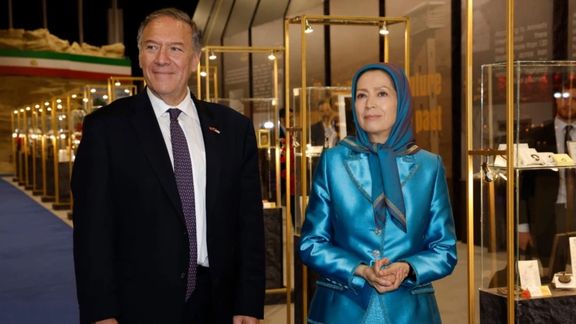
Iran’s Fars news website affiliated with the Revolutionary Guard Wednesday called for targeting an opposition group in Europe with ballistic missiles and drones.
In an article with a long historical background on violent terror acts by the Mojahedin Khalq organization, known as Mek in the 1980s, the IRGC mouthpiece insisted that Iran has the Islamic Republic has the right to self-defense and it would be justified if “it employs hard power against terrorists. The capabilities of Iran’s attack drones and ballistic missiles can be used to hit the center of the [Mek] in Albania without any legal impediment.
The article added that authorities in Tehran should issue the necessary warning to the Albanian government, which is hosting a few thousands MeK members, and follow it up with military action.
But Fars also mentioned “host governments”, where the MeK might have a presence, which could include France and others in Europe.
“If host governments refuse to expel and extradite the hypocrites (a term used by Tehran for the MeK), they should be threatened with reciprocal action…based on the doctrine of the Islamic Republic to fight security threats at their source,” the article said. It went on to cite the principle of “Responsibility to Protect” the nation and the UN Charter’s article 51, “which allows military action to preserve international peace and security.”
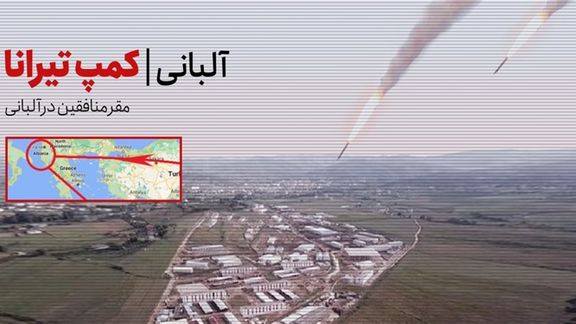
The Mojahedin were a revolutionary group engaged in opposition to the monarchy in the 1970s and carried out armed attacks. They fully backed Ayatollah Ruhollah Khomeini’s decision to set up the Islamic Republic in early 1979 after Shah Mohammad Reza Pahlavi left the country and Khomeini returned from exile. However, tensions rose between the group and the clerical regime taking shape, which led to mutual violence.
The MeK leadership fled to Iraq, which had attacked Iran in September 1980, and received protection from the Iraqi dictator Saddam Hussein who helped them form a militia and fight against Iran. The Islamic Republic counts this as high treason, in addition to violent acts the group carried out inside Iran.
In 1988, the Islamic Republic carried out a decision blessed by Khomeini to kill around 3,000 members of the group serving their prison sentences. Many say this is equivalent to war crimes and a crime against humanity.
An Iranian diplomat who plotted to bomb a MeK rally in Paris was convicted and sentenced to 20 years in jail on terrorism charges by a Belgian court, and a former prison Guard was recently sentenced to life in Sweden for his role in the 1988 prison killings.
MeK members and sympathizers gradually migrated to Europe and North America where they formed a close-knit organization, sometimes likened to a sect, which increasingly changed its path as a terror group to a relatively rich lobbying organization in the West against the clerical regime. However, a few thousand members who had stayed behind in a camp in Iraq were transferred to European counties and Albania by the United States and the United Nations in 2016.
The same year the group opened an office in Albania and is generally referred to as an Albania-based organization. Until a few years before the move, MeK was listed as a terrorist organization by the United States and the European Union, but as it became a lobbying and political entity, the designations were lifted.
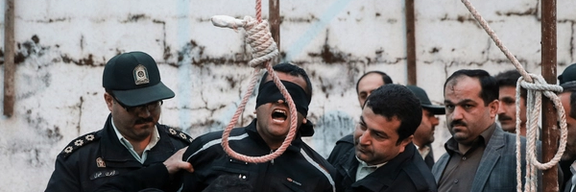
Two human rights organizations say Iran has embarked on an execution spree at a “horrifying pace” with at least 251 cases between January 1 and June 30, 2022.
Amnesty International and the Abdorrahman Boroumand Center for Human Rights in Iran said in a report on Wednesday that the actual number is likely higher, as authorities keep secret figures on death sentences passed and executed.
The rights organizations compiled the figure from a variety of sources, including prisoners, relatives of those executed, human rights defenders, journalists, and reports by state media as well as independent media outlets and human rights organizations.
They warned that if executions continue at this pace, they will soon surpass the total of 314 executions recorded for the whole of 2021, according to Amnesty’s data.
At least 86 people were executed for drug-related offenses that do not carry the death penalty under international law, including many members of the Baluchi ethnicity, a minority people living in Iran’s south-east bordering Pakistan and Afghanistan.
Most of those executed in 2022 – 146 -- had been convicted of murder with well-documented patterns of executions being systematically carried out following “grossly unfair trials.”
“During the first six months of 2022, the Iranian authorities executed at least one person a day on average. The state machinery is carrying out killings on a mass scale across the country in an abhorrent assault on the right to life, said the deputy regional director for the Middle East and North Africa at Amnesty International, Diana Eltahawy. She added that "Iran’s staggering execution toll for the first half of this year has chilling echoes of 2015 when there was another shocking spike.”
Executive Director of Abdorrahman Boroumand Center, Roya Boroumand, called on the Iranian authorities to immediately establish an official moratorium on executions with a view to abolishing the death penalty completely, saying, “The renewed surge in executions, including in public, shows yet again just how out of step Iran is with the rest of the world, with 144 countries having rejected the death penalty in law or practice.”
On 23 July, the Islamic Republic also executed one man in public in southwestern Fars province, after a halt in public executions for about two years during the covid-19 pandemic.
On June 16, UN Secretary General António Guterres released a report on the situation of human rights in Iran, decrying “the high number of death penalty sentences and executions” and “reports of death in prison due to denial of adequate and timely medical care.”
The UN chief said that the number of executions in Iran increased from at least 260 cases in 2020 to 310 individuals in 2021, and the number continued to rise into 2022.

Former US president Donald Trump says Washington is allowing Iran to build “a massive nuclear weapon,” criticizing the Biden administration’s policies regarding the Islamic Republic.
Delivering a keynote speech on rising crime in the United States on the second day of a two-day America First Agenda Summit on Tuesday, July 26, in Washington, Trump said Iran would never have been allowed to develop nuclear weapons if he had been the president.
“They (Iran) were dying to make a deal. They would have made a deal with us right after the election, and it would have been a good deal,” he added.
Trump claimed that “Iran, China, Russia and North Korea weren't going to do a thing against us just two years ago,” but now “we're a nation that is no longer respected or listened to around the world. We are a nation that in many ways has become a joke.”
Lashing out the policies of President Joe Biden and the Democratic Party for the country's ills, he decried Biden allowing an "invasion" by millions of migrants crossing the southern border, highest inflation in 49 years and highest gas prices “in the history of our country." "Our country is going to hell and is going to hell very fast... We are a nation in decline. We are a failing nation."
He stopped short of declaring his candidacy but hinted that he would run for president in the next election, noting that a Republican will be back in the White House in 2024.
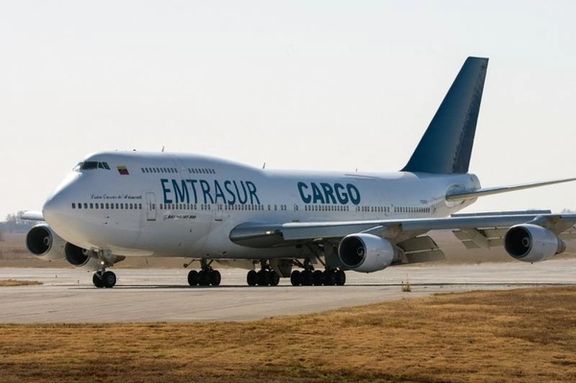
Eleven Republican Senators have sent a letter to the US attorney general for what they say is a delay in helping with information on Iranians held by Argentina.
The influential Senators, including Lindsey Graham, Marco Rubio and Chuck Grassley and Ted Cruz have signed the letter led by Sen. Joni Ernst of Iowa say that after Argentina detained Iranians with links to the Revolutionary Guard in early June, the Biden Administration “has refused to provide key Argentinian law enforcement officials information confirming links to terrorist activities.”
Argentina’s security minister Anibal Fernández tweeted on June 11 that the government detained a Venezuelan plane sanctioned by the United States and withheld the passport of five Iranian crew members. The admission by the minister came after a local website reported on the incident. Later it was revealed that the pilot of the Iranian plane “leased” to a Venezuelan cargo carrier.
A week later, as Argentina downplayed any links with the Revolutionary Guard, head of the Paraguayan National Intelligence Secretariat Esteban Aquino said Captain Gholamreza Ghasemi of the 747 cargo plane was a member of the IRGC Qods (Quds) Force, sanctioned by the US for terror activities.
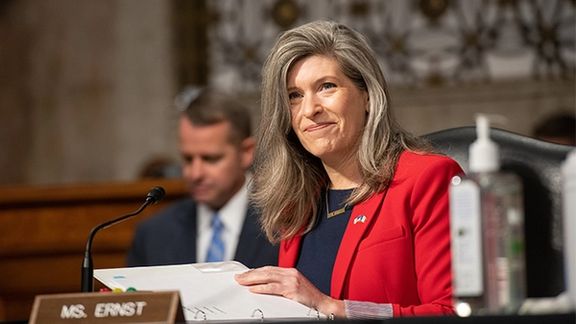
According to the senators who have sent a letter to Attorney General Merrick Garland, the Argentinian judiciary has asked for information “key to their investigation into the Iranian suspects” held since June. The senators say that “The Argentine judiciary, through standard process which is called the Mutual Legal Assistance Treaty (MLAT) program, requested information from the Justice Department on the potential involvement of the plane and its crew in support of international terrorism.”
The letter accuses the Biden administration of delaying information because it pursues to revive the 2015 nuclear agreement known as the JCPOA, which former President Donald Trump abandoned in 2018.
The senators say the alleged delay is “all to prioritize the administration’s desperate and misguided pursuit of a new Iran nuclear deal, it would be a disgrace and completely unacceptable. We need assurances right away that vital information will be promptly provided, along with a full explanation for the delay,”
The administration has yet to respond to the accusation, but its record in relation to Iran has been mixed since it launched indirect talks in Vienna in April 2021 to revive the JCPOA.
While the Biden team has issues new sanctions against individuals and companies involved in clandestine Iranian activities violating previous US sanctions, the administration has not vigorously enforced the major economic sanctions against Iran’s oil exports.
Since early 2021, China has more than doubled its illicit imports of discounted oil from the Islamic Republic, throwing a lifeline to its dire finances.
The senators warned that if it tuns out the administration purposely delayed or ignored Argentinian requests needed to carry out their investigation, “it would be a disgrace and completely unacceptable.” Sen, Ernst was quoted as saying, “We need assurances right away that vital information will be promptly provided, along with a full explanation for the delay.”
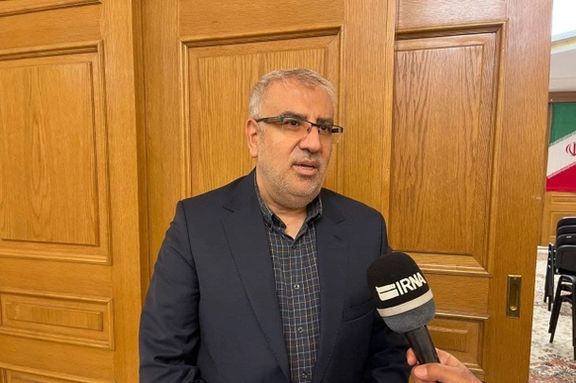
Iran's gas export revenue for the first four months of the Iranian year (March 21 to July 21) reached almost $4 billion, local media quoted Oil Minister Javad Owji as saying on Wednesday.
The country sits on the world’s second-largest gas reserves after Russia, but years of various international sanctions have prevented the technological development of its gas export sector.
"We have collected close to $4 billion of gas exports for the first four months of the year, which is nearly as much as what was collected for the entire previous year," Owji said.
On Tuesday Iran made a claim that its oil export revenues climbed by 580 percent from March 2021 to March 2022, although other government data show little revenue flowed into its treasury. Iran’s high inflation and a falling currency keep the economy in a crisis.
Iran mainly exports gas to Turkey and Iraq, but its delivery has not always been reliable due to debt-payment issues with Baghdad, Iran's own domestic consumption needs, and occasional technical problems which forced a momentary halt in exports to Turkey over the winter.
The Iranian government says it has found ways to repatriate funds from earlier energy exports and reached an agreement to resume gas supplies to Iraq in April as Baghdad paid part of its debts owed to Tehran.
Global gas prices have risen almost fivefold in 2022 and it is possible that Iran earned one billion dollars a month, although last year its gas exports totaled $4 billion.